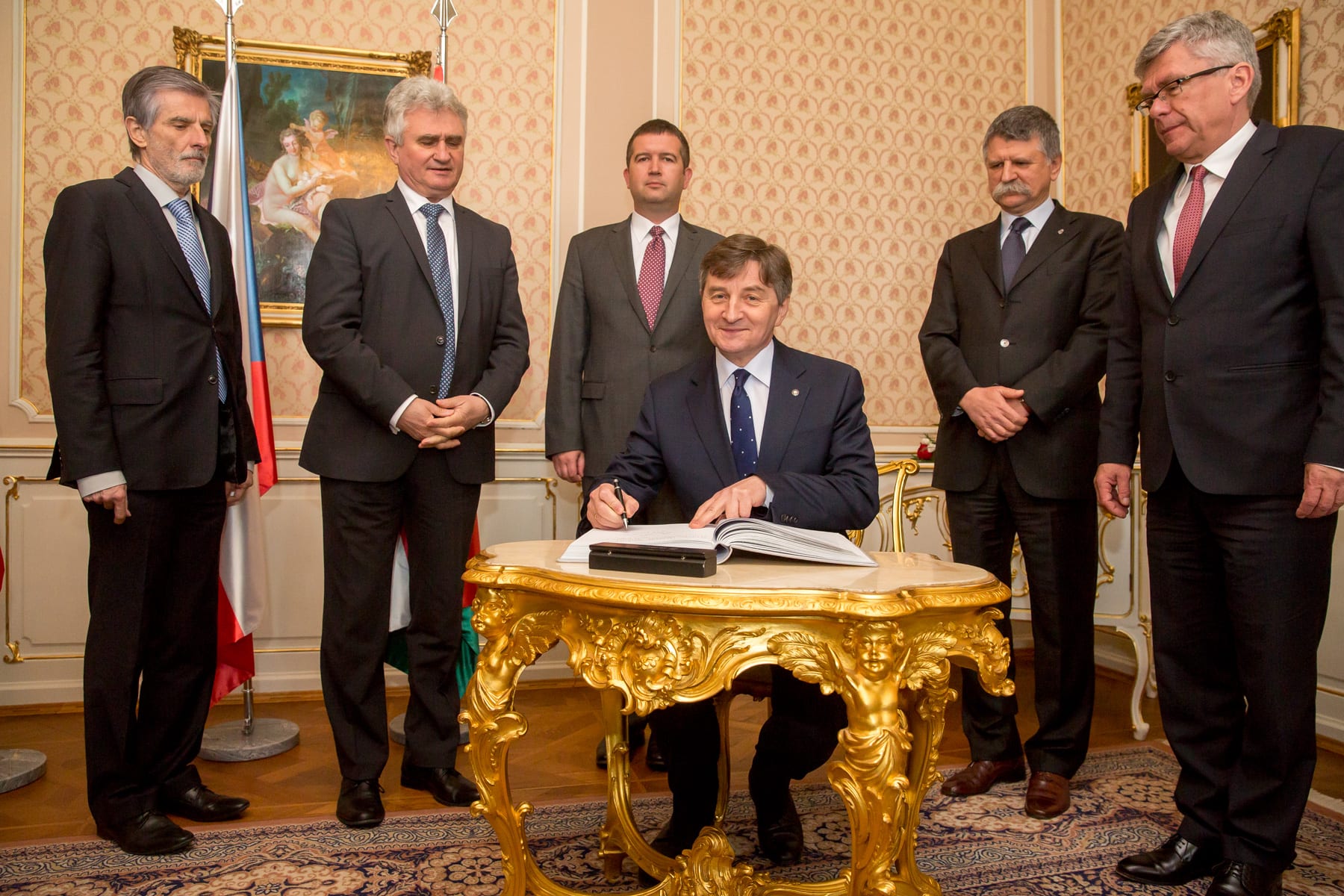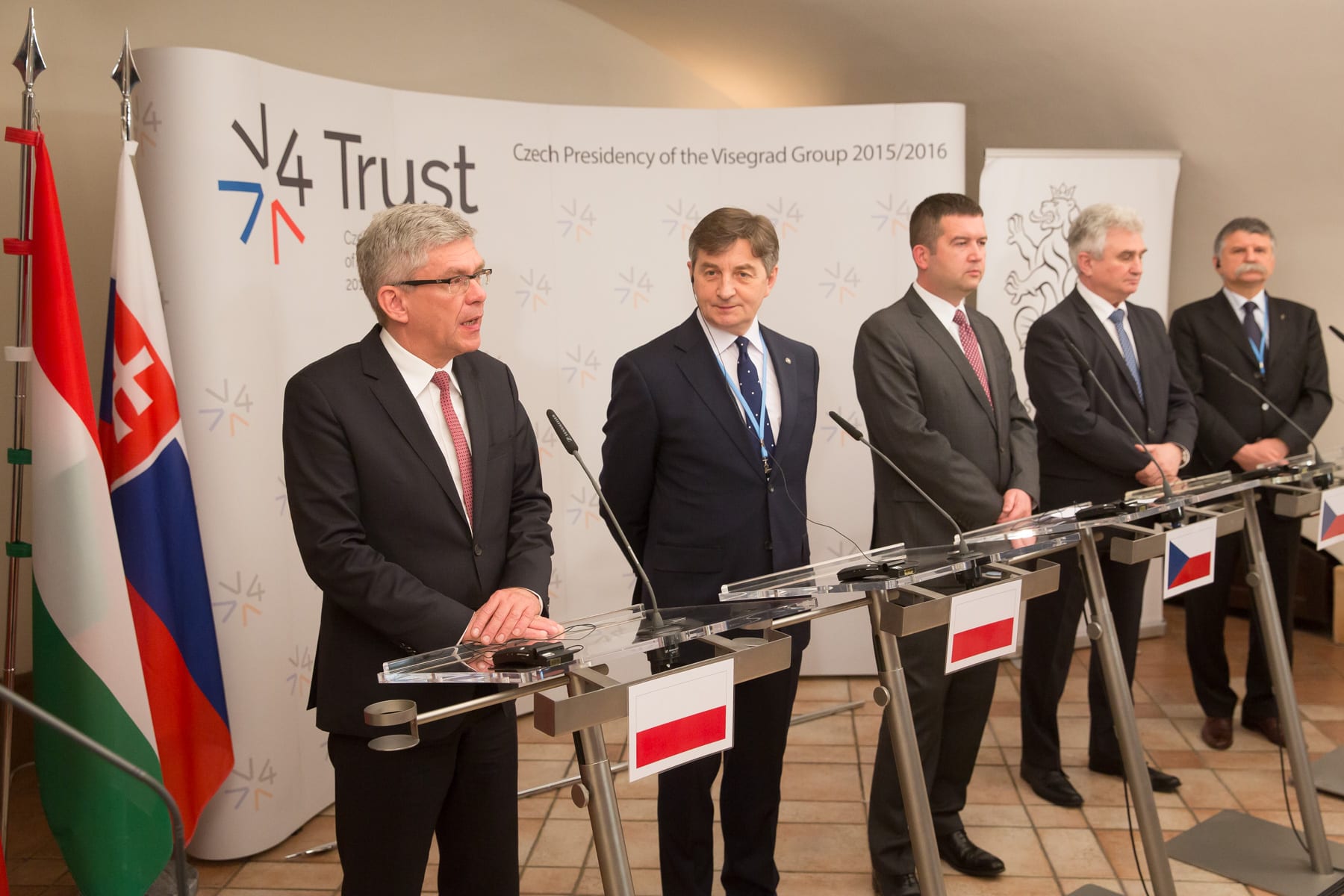The Marshals of the Sejm and Senate Marek Kuchciński and Stanisław Karczewski met today (April 27) at the Štiřín Castle in the Czech Republic with the heads of the parliamentary chambers of the Visegrad Group.
The Polish delegation was accompanied by the Polish Ambassador to the Czech Republic Grazyna Bernatowicz. Talks between politicians focused on strengthening the role of national parliaments in accordance with the UK-EU agreement and the current situation in the EU. The meeting was held as part of the Czech presidency of the V4 Group. At the invitation of the hosts, the President of the French National Assembly Claude Bartolone also took part in the event.
The meeting was opened by Jan Hamáček, Head of the Czech Chamber of Deputies. He referred to the current situation in Europe. He stressed that in the face of current challenges, Member States should fight for a strong and solidary Europe. He also stressed that the V4 concept is a good political brand, which is able to cooperate and work out common positions. According to the President such meetings are a good opportunity to exchange views and have a constructive discussion.
In the first part of the meeting politicians discussed issues related to the strengthening of the role of national parliaments in accordance with the agreement of 19 February between the United Kingdom and the European Union. The President of the French National Assembly Claude Bartolone started the discussion by stressing the importance of a strong position of national parliaments. The President also referred to the terrorist threats in Europe. He stressed that national parliaments should support the governments in their fight against the threats, but at the same time they should make sure that the balance between the protection of citizens and their rights and freedoms is kept.
The politicians also discussed the current situation in the European Union and topics related to its future, including the planned referendum in the United Kingdom. The discussion also addressed issues related to trust between member states and national sovereignty.
Marek Kuchciński, Speaker of the Sejm, emphasized that Poland sees its future in a well-functioning, reformed Union: in a Europe of solidary states. He also pointed out that in Poland over 80 percent of citizens support EU membership. As the Speaker of the Sejm pointed out, one of the problems within the EU is the lack of transparency in the work of its institutions. He also mentioned the importance of improving the functioning of individual EU institutions, especially their decision-making capacity and mandate. Speaker Kuchciński also referred to the issue of introducing new mechanisms of national parliaments' involvement in EU affairs. He also spoke, among others, about the mechanism of the so-called red card, which is provided for in the agreement between the United Kingdom and the European Union of 19 February 2016. - The more national parliaments are involved in European topics, the better the mutual knowledge and understanding between countries will be, he said. The Speaker also stressed that preserving the sovereignty and independence of individual countries within the membership of the Union is extremely important. - Freedom and love of independence are strong Polish values - said the Speaker. Marek Kuchciński also stressed that he is in favour of strengthening the instruments of cooperation with neighbors, e.g. within the framework of the Eastern Partnership.
The Speaker of the Sejm also presented to the participants of the meeting the draft declaration "Europe of Solidary States" on security, borders and renewal of EU institutions. The document is a response to the Rome-based proposal for a federal Europe signed by the presidents of the parliaments of Italy, Germany, France and Luxembourg last September. The draft joint declaration will be discussed during the Polish Presidency of the Visegrad Group.
The Speaker of the Senate Stanisław Karczewski also took the floor in the discussion. He stressed that the Polish vision for the future of the EU is a solidary and economically competitive Union. In the context of the probability of Britain's withdrawal from the EU structures, the Speaker said that Britain's continued membership was in the interest of Poland and all other countries.
The heads of the Houses of Parliament also touched on joint action in the fight against terrorism.
The Visegrad Group is the primary form of Poland's engagement in regional cooperation. On February 15 this year, on the occasion of the 25th anniversary of the group, a joint declaration of the V4 countries was signed. In the framework of the agreement, Poland, the Czech Republic, Slovakia and Hungary undertook - on the basis of the positive balance of cooperation to date - to increase joint action and engagement, in particular with regard to external threats. Meetings of the Presidents of the V4 National Parliaments have been held since 2003. They provide a forum for the exchange of experience on matters of regional and EU relevance. They also provide an opportunity to share views on current issues, coordinate positions and launch joint initiatives. So far, the Presidents have discussed, among others: competences of national parliaments in European affairs, security of energy supply, Eastern Partnership, EU tax policy, cohesion policy, prospects and consequences of the entry into force of the Lisbon Treaty, EU enlargement. Within the framework of the parliamentary cooperation of the Visegrad Group countries, the representatives of the Committees for European Union Affairs, Public Administration and Regional Development as well as Foreign Affairs also meet on a regular basis. The parliamentarians sitting on committees dealing with economic issues also cooperate with each other. In July this year, Poland will take over the Presidency of the Visegrad Group from the Czech Republic.
text: Chancellery of the Sejm
photo: Pawel Kula




